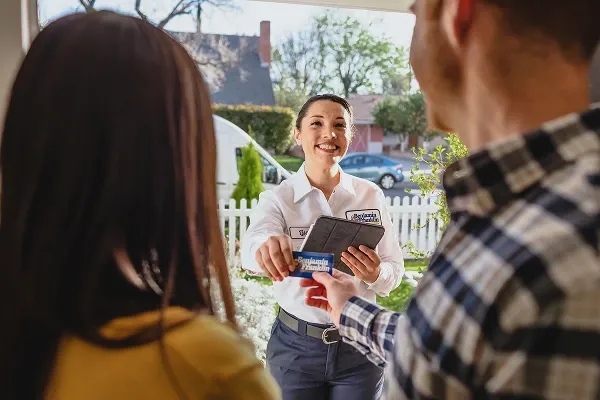Named Forbes' Top Ranked Plumbing Company of 2024!


Before you call us, look here for answers to some of the most frequently asked plumbing questions.
When manufacturers pre-set your water heater before it leaves the factory, the standard practice is to set it at 120°F. This temperature will probably be suitable for your household, but older models should be kept on the “medium” setting.
Before you attempt any maintenance, be sure to remove the risk of electrocution (from exposed wires) by turning off the heater’s electricity.
If you need to adjust the temperature, here’s how to find your dial:
Only a professional, (like the plumbers at Benjamin Franklin Plumbing® of Andover), can determine the best temperature for your household’s needs. Generally, hotter is better, as heat kills bacteria.
These are likely the result of air in your pipes, meaning they’ve lost what we call their “air cushion.” You can easily fix this if you:
The most likely explanation for an unintentional increase in water use is a leaking toilet. You can test for a leak by checking the water level in the tank and seeing whether the overflow pipe has water flowing into it. (This pipe is located in the middle of the tank and is connected to a small tube).
If the overflow pipe does, in fact, have water running into it, you can stop the flow by adjusting the fill valve. Set it to about an inch below the overflow tube’s top, or look at the side of the tank and adjust it to the level of the water level mark you’ll see stamped there.
Your toilet may need replacement if you can see fissures or cracks in the bowl or tank, or if your mounting or rings show signs of deterioration.
When it’s time to choose a replacement, keep in mind that a toilet, like any plumbing fixture, will have the best chance of a long lifespan of use if it’s made by a well-known, widely respected manufacturer. Here at Benjamin Franklin Plumbing® of Andover, we have many quality products to choose from, some of which can lower your water usage per flush.
Before discussing solutions, it’s important to understand the root cause of the problem. These odors typically come from food debris which has built up in your disposal over time.
Here’s our recipe for cleaning out the debris and eliminating these odors:
What you’ll need:
Directions:
What you’re describing are mineral deposits, a sign that your home could benefit from water softening and conditioning from Benjamin Franklin Plumbing® of Andover through our H2O Harmony system.
This can prevent these deposits in the future, but to get them off your showerhead now, first pour a cup of vinegar into a plastic bag. Position this bag over the showerhead, with a twist tie placed around it to make sure it stays in place overnight. (You might also be able to remove the aerators from the faucet and give them an overnight soaking in vinegar).
The next morning, take the bag off the showerhead. By now, the vinegar will have reacted with the deposits, allowing them to be gently scrubbed off with a toothbrush.
Short answer: nothing good.
Long answer: Root intrusion is common when shrub roots and tree roots are able to reach the points of entries of pipes. Soon, a pipe will be totally blocked by root masses, which only become worse clogs when they interrupt the flow to your home’s main sewer and attract and hold onto debris such as grease and toilet paper.
As a result, you’ll notice a reduction in your water flow, drains that run slower than they used to, and often total drain blockage. The problem can also cause damage to the pipe. Intruding roots continue to grow after they’ve entered a pipe, creating pressure that can lead to cracks and, ultimately, total pipe collapse.
You can and should be doing regular water heater maintenance:
If you want to avoid the trouble of doing all this maintenance yourself, an annual water heater flush and inspection are included in our protection plans.
Most likely, this is a sign of sediment build-up on the bottom of the heater. When water gets trapped in the sediment, it can boil, producing the sound you’re hearing. This indicates a lack of efficiency in the water heater’s operation, as sediment is preventing heat from transferring to the water stored in the tank.
For a solution, you can try hooking a drain hose up to the valve found at the bottom of the tank, in order to drain a few gallons of water. Allow the draining from the bottom of the tank to continue for about five minutes.
If you attempt this, here are some safety precautions:
If you have sediment build-up, it probably means you have an old water heater model. Newer models are better at preventing build-up, so it may be more cost-effective to get a replacement than to attempt a repair. You may even consider a tankless water heater for increased efficiency.
You have several courses of action. Here they are, starting with the most basic:
Benjamin Franklin Plumbing® of Andover!
Dustin Macuirzynski
Elliot was a great salesmen and was honest which is hard to find nowadays. He told me what is a must fix and gave me a great scope of work. The company also gave me an amazing price on a new install of my oil tank. Nick, melichai and gentry were punctual, friendly and gave me a great time line of what was happening step by step. I could not be more please with how this turned out and this company. They quoted me and showed up the next day to complete the work and it’s amazing. Thank you and I would definitely recommend hiring them! If I have a plumbing issue in the future they will be my first call!
Domina Marmaduke
They are an awesome company, they ran into some issues and were more than accomodating to fix without additional charges and did a great job. I haven't had hot water in a month, not because of them either. I had other people out to check it for me and none were as thorough as Ben Franklin
Damon Ambrosio
I had an excellent experience with Benjamin Franklin Plumbing. From the moment I called, they were extremely responsive. Someone answered right away and scheduled a visit for the same day. The plumber, Nick arrived on time, assessed the issue quickly, and got to work without wasting a minute. What stood out most was how thorough they were. They didn't just fix the immediate problem but also took the time to check the surrounding areas to make sure everything was working properly. It's clear they take pride in doing the job right the first time. Highly recommend them to anyone looking for trustworthy and professional plumbing help.
GirryCar Cooper
I had the pleasure of meeting one of their employees, Michael, this morning for an estimate. He took the time to walk me through everything and also educated me on plumbing and safety. He was incredibly patient, polite, and punctual. I truly appreciate the level of professionalism and care he showed. The prices are very reasonable, and I’m happy to have found this company. I’ll definitely be sticking with them going forward. Highly recommend! Grateful and happy new customer here.
Benjamin Franklin Plumbing® of Andover
580 Lake Rd.License #P1-281231
